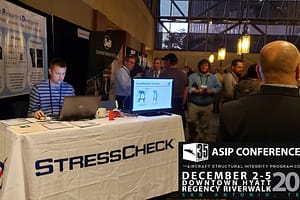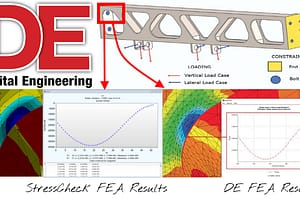Altair Innovation Intelligence Publishes a S.A.F.E.R. Simulation Primer
Last week, ESRD wrote a guest contribution for Altair’s Innovation Intelligence blog titled “Hyper-Fidelity Structural Analysis for S.A.F.E.R. Numerical Simulation in the Aerospace Industry“. Thanks to Altair for their collaboration and support of S.A.F.E.R. Simulation.
This guest contribution was intended to compliment and preview Altair’s October 17th ESRD use case webinar (don’t worry if you missed this webinar, the recording is already available).
Here’s an excerpt from the Innovation Intelligence blog article:
Across the engineering community there is much discussion about the democratization of simulation; meaning the reliable use of numerical simulation by non-simulation experts who may be design engineers, new analysts, or occasional users. The hope is that much of the complexity, time, and risk of performing FEA can be wrung out of simulation in a way that finally allows simulation-driven design to be led by design engineers. Indeed democratization has great potential in the A&D industry to compress the product development lifecycle, but is it realistic? The answer few may want to hear is that this will not be easy to accomplish using legacy FEA technologies, methodologies, and software tools.
The key takeaways are as follows:
- The pressure on engineering organizations to support the increasing complexity, higher performance, shorter design cycles, and longer life expectancy of products they produce and maintain is relentless.
- Legacy computational methodologies, software tools, and simulation processes that have been used for years to perform FEA are slow to master, precarious to use, and unreliable in the hands of the non-expert or infrequent user. Sources of errors are numerous and results are often dependent on the user, model, mesh, and software.
- There is unfortunately a reluctance by some managers and team leaders to support the performance of more computationally-based 3D detail stress analysis due to the perceived time and complexity involved, especially when compared to relying on handbook solutions, design curves, closed form approximations, homegrown spreadsheets, higher margins of safety, or ultimately more time for physical prototyping and testing.
- A different approach to numerical simulation has been developed and commercialized by APA partner ESRD which takes much of the art and craft out of finite element modelling.
- The result is that the performance of structural analysis is more simple, accurate, fast, efficient, and reliable for both the frequent expert and only occasional user (S.A.F.E.R.).
Thoughts? Feedback? Leave us a comment!
 Serving the Numerical Simulation community since 1989
Serving the Numerical Simulation community since 1989 











Leave a Reply
We appreciate your feedback!
You must be logged in to post a comment.